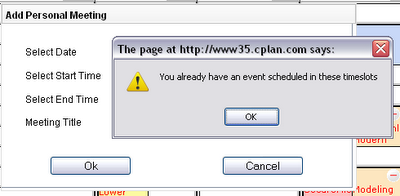
But there are two types of sessions that Oracle selects for you - the keynote presentations, during which no other sessions are scheduled, and the "Executive Solution Sessions," which are sessions that Oracle sponsors hope that you will attend. You can remove the Executive Solution Sessions from your schedule, but you can't remove the keynotes, because you'd obviously want to attend all of them.
The Oracle Schedule Builder also has another facility, "Add Personal Meeting." This allows you to add unconference sessions to your schedule, and also to add networking opportunities. Much of the power of Oracle OpenWorld - or, for that matter, any conference - is the networking opportunities that can occur with people from Oracle, media people, vendors, and people using Oracle. (What, did you think the sole purpose of the blogger meetups was to drink beer? Don't answer that.)

I haven't transferred my session information to my work calendar or any of my personal calendars yet, because the Oracle OpenWorld schedule is often in flux and it would be easier to transfer it all later. So at the moment, everything is in Schedule Builder. This is probably a bonus from Oracle's perspective, since any information service wants you to go to their site to get information. While Oracle provides the opportunity to export Schedule Builder data to a non-Oracle application, they would prefer that you keep your information with them. (Sound familiar?)
So anyways, I have a networking opportunity with various Oracle people during Oracle OpenWorld, and I wanted to make sure that I remembered it. Since my schedule information is still in Schedule Builder, I figured I'd use the "Add Personal Meeting" feature.

Yes, I do already have an event scheduled for that time - one of the keynote presentations. Which I can't delete. In essence, this means that I CANNOT use the Oracle solution to store my schedule, and that I MUST use a third-party solution that gives me greater flexibility.
Now this is obviously a trivial example, but we can learn from it. In this case, there are two competing factions at Oracle with different objectives:
- There's the one competing faction at Oracle that wants to provide this particular networking opportunity, and (I'm guessing here) probably chose this time for the networking opportunity because only one other event was going on at the time. In their minds, the networking opportunity is paramount.
- There's the other competing faction at Oracle that wants to make sure that all Oracle OpenWorld attendees are at the important sessions, and therefore wants to make sure that nothing else is going on during these sessions. In their minds, the keynotes are paramount.
These types of things are going to occur at all times. Even if you get 100% of a company's employees to sign an "I love the company's vision statement" manifesto, there are always times when there are disagreements on the details. I'd bet that each of the competing Oracle factions believe that they are guardians of Oracle's vision, and that it's the other side that has deviated. And obviously it's not just Oracle, and it's not even just big companies - if you have a two-person company, the two people could obviously disagree on tactics, even if they agree on strategy.
I'd ask my readers how you can prevent these conflicts, but why bother? You can't. You just need to deal with them and move forward.
And for the keynoter whose session I'm skipping, I trust that your company will provide details about the keynote later.
